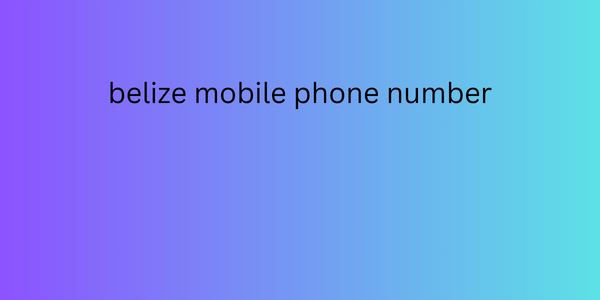Inefficient data management
Posted: Thu Dec 05, 2024 8:02 am
Managing paper documents is labor-intensive and prone to human error. Organizing, storing, retrieving, and updating information becomes a cumbersome and time-consuming process that takes valuable time and resources away from direct patient care. Furthermore, maintaining numerous physical data storage systems costs healthcare institutions significant operational costs.
Safety concerns
Securing paper belize mobile phone number documents is an ongoing challenge for healthcare organizations. Unauthorized access and breaches of patient confidentiality can occur due to lax document storage or improper storage facilities. Unlike electronic systems that can embed strong access controls and encryption, paper documents do not have comprehensive protection capabilities, putting sensitive health information at risk.

Barriers to integrated care
Paper documents hinder seamless integration of healthcare services. Sharing confidential patient information between different healthcare providers requires tedious copying, printing, and mailing of documents, resulting in inefficient communication and prone to errors. Therefore, the inability to timely share patient records and real-time updates can negatively impact healthcare collaboration efforts.
The inefficiencies inherent in paper-based documentation highlight the need to move to a more dynamic and reliable management solution. The shift to electronic health records will help address these shortcomings by enhancing accessibility, security and data management, which will become increasingly essential in 2024.
Benefits of Electronic Health Records (EHR)
The transition from paper-based records to electronic health record (EHR) systems is not just about technological advancements; it's also about transforming patient care and operational efficiency in healthcare settings. Understanding the many benefits of EHR systems helps explain why this shift is so important for healthcare providers.
Improved accessibility and efficiency
Accessibility is a key advantage of EHR systems. Unlike paper records that are confined to a single location, electronic records can be accessed from multiple points throughout the care journey. This means that healthcare providers, whether specialists or lay professionals, can retrieve the necessary information almost instantly, enabling faster, more informed decisions.
Efficiency in patient record management has been greatly improved. EHR systems reduce the time spent on administrative tasks such as storing, organizing, and retrieving documents. Automated processes within EHR systems reduce workflow, allowing healthcare staff to focus more on patient care instead of paperwork.
Improved patient care
EHRs play a key role in improving the quality of patient care. With comprehensive and up-to-date health information at their fingertips, medical professionals can better diagnose and plan appropriate treatment for their patients. EHRs help providers keep a more accurate track of patient histories, prevent medical errors by alerting to potential drug interactions, and facilitate preventive care through proactive health monitoring.
Data Security and Compliance
The security capabilities of EHR systems are far superior to those of paper-based record systems. With advanced encryption techniques, access controls, and audit trails, EHRs protect sensitive patient data from unauthorized access and potential breaches. Additionally, EHRs are designed to comply with strict healthcare regulations, such as HIPAA, to ensure strict adherence to data privacy standards.
Safety concerns
Securing paper belize mobile phone number documents is an ongoing challenge for healthcare organizations. Unauthorized access and breaches of patient confidentiality can occur due to lax document storage or improper storage facilities. Unlike electronic systems that can embed strong access controls and encryption, paper documents do not have comprehensive protection capabilities, putting sensitive health information at risk.

Barriers to integrated care
Paper documents hinder seamless integration of healthcare services. Sharing confidential patient information between different healthcare providers requires tedious copying, printing, and mailing of documents, resulting in inefficient communication and prone to errors. Therefore, the inability to timely share patient records and real-time updates can negatively impact healthcare collaboration efforts.
The inefficiencies inherent in paper-based documentation highlight the need to move to a more dynamic and reliable management solution. The shift to electronic health records will help address these shortcomings by enhancing accessibility, security and data management, which will become increasingly essential in 2024.
Benefits of Electronic Health Records (EHR)
The transition from paper-based records to electronic health record (EHR) systems is not just about technological advancements; it's also about transforming patient care and operational efficiency in healthcare settings. Understanding the many benefits of EHR systems helps explain why this shift is so important for healthcare providers.
Improved accessibility and efficiency
Accessibility is a key advantage of EHR systems. Unlike paper records that are confined to a single location, electronic records can be accessed from multiple points throughout the care journey. This means that healthcare providers, whether specialists or lay professionals, can retrieve the necessary information almost instantly, enabling faster, more informed decisions.
Efficiency in patient record management has been greatly improved. EHR systems reduce the time spent on administrative tasks such as storing, organizing, and retrieving documents. Automated processes within EHR systems reduce workflow, allowing healthcare staff to focus more on patient care instead of paperwork.
Improved patient care
EHRs play a key role in improving the quality of patient care. With comprehensive and up-to-date health information at their fingertips, medical professionals can better diagnose and plan appropriate treatment for their patients. EHRs help providers keep a more accurate track of patient histories, prevent medical errors by alerting to potential drug interactions, and facilitate preventive care through proactive health monitoring.
Data Security and Compliance
The security capabilities of EHR systems are far superior to those of paper-based record systems. With advanced encryption techniques, access controls, and audit trails, EHRs protect sensitive patient data from unauthorized access and potential breaches. Additionally, EHRs are designed to comply with strict healthcare regulations, such as HIPAA, to ensure strict adherence to data privacy standards.